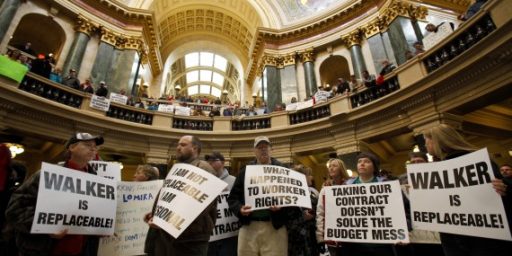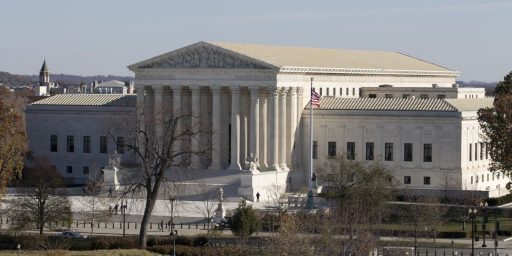The Free Market and Unions
Kevin Carson has some interesting thoughts about the intersection of unions, management, and government. Here’s a snippet:
The most obvious forms of state intervention that hobble labor are legislation like:
1) The provisions of Taft-Hartley which criminalize sympathy and boycott strikes;
2) The Railway Labor Relations Act and the “cooling off” provisions of Taft-Hartley, which enable the government to prevent a strike from spreading to common carriers and thus becoming a general strike; and
3) “Right-to-Work” (sic) laws, which restrict the freedom of contract by forbidding employers to enter into union shop contracts with a bargaining agent.
Further, we should examine the extent to which even ostensibly pro-labor laws, like the Wagner Act, have served in practice to weaken the bargaining power of labor. Before Wagner, what is today regarded as the conventional strike — an announced walkout associated with a formal ultimatum — was only one tactic among many used by unions.
[…]
The model of industrial unionism established under Wagner had actually been advocated before then by a major segment of capital. Industrial unionism, and the New Deal labor accord in general, was supported by large, capital-intensive, export-oriented industries for which labor costs were a relatively modest part of the entire cost package, but which had long planning horizons and the need for long-term stability and predictability. These industries were willing to trade significant wage increases, job security and improved working conditions in return for more stable control of the production process. They were willing to offer seniority and productivity-based wage increases, in return for a union policy of “letting the managers manage.”
Read the whole thing. There’s some interesting stuff in there.






Being a bit autistic, I always stumble on arguments that require an emotional link. For instance, government workers need unions because wealth is concentrated in the top 1%. Or, government workers need unions because the law is not 100% pro-union.
Huh?
"Pension costs could consume one-third of the city budget within five years, so it's absolutely essential that Los Angeles leaders and public employee unions cut retirement expenses."
… but wealth is concentrated with hedge fund managers, so of course LA's budget will work out.
Many of those restrictions on organized labor were imposed as part and parcel with the recognition that the union monopoly on labor could serve some purpose. As opposed to monopolies on finance, raw materials, machine tools, etc.
So the new and improved question is not are these restrictions to onerous but whether we should continue to permit monopolistic practices on the part of labor. If so, then perhaps unions need to be overseen by government organizations like public utility monopolies.
BTW, he totally misrepresents Right-To-Work which simply states that while a collective bargaining unit can be formed and a contract can be negotiated under labor laws, an individual wishing to work for the employer cannot be required to join the union or pay dues simply to obtain work. That is the citizen has a right to work without asking permission or paying off of some monopolistic labor cartel.
And you JKB, totally misrepresnt the purpose of "R t W" which is union busting. Nobody is forced to join a union. If someone doesn't want to join a union, if they don't want to enjoy the higher wages and better benefits that come with a union job, they can just quit and go to work for Wal-Mart.
“Right-to-Work” (sic) laws, which restrict the freedom of contract by forbidding employers to enter into union shop contracts with a bargaining agent.
Right and unions to interfere with neither non-union workers and firms right to enter into whatever contract they like. Whenever you use the power of the State to do something somebody's freedoms are hindered.
Why go to work for Wal-Mart when you can sit quietly at a broken computer, doing nothing, for $100K, eh tom?
http://www.nytimes.com/2010/12/08/nyregion/08schools.html